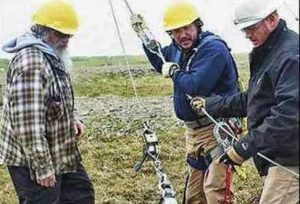
Anchorage, Alaska – U.S. Attorney Bryan Schroder announced that James Michael Wells, 68, was sentenced today by U.S. District Judge Sharon L. Gleason to serve life in federal prison for the April 2012 murders of two U.S. Coast Guard (USCG) employees, Electrician’s Mate First Class James Hopkins and retired Chief Boatswain’s Mate Richard Belisle.
Wells was arrested in February 2013 for the murders of Hopkins and Belisle, who were both Wells’ co-workers at the USCG antenna maintenance facility, located at the USCG Communication Station (COMMSTA) on Kodiak Island, Alaska. Wells was convicted in 2014 and the case was reversed by the Ninth Circuit Court of Appeals in December 2017. After a three-week long re-trial that ended in October 2019, a federal jury convicted Wells of two counts of first degree murder, two counts of murder of an officer or employee of the United States, and two counts of possession and use of a firearm in relation to a crime of violence.
“James Wells has received the sentence he deserves for snuffing out the lives of two fine men,” said U.S. Attorney Bryan Schroder. “The thought of a Coast Guard employee plotting and killing two of his shipmates is shocking and abhorrent in an organization known for its core values of Honor, Respect, and Devotion to Duty. Petty Officer First Class James Hopkins and retired Chief Rich Belisle embodied those values, and their families can take comfort in two lives well-lived.”
“This case illustrates the tireless pursuit and determination of agents and prosecutors to ensure justice was served on behalf of the Hopkins and Belisle families, who remain in our thoughts,” said Jeffery Peterson, the Special Agent in Charge of FBI’s Anchorage Field Office. “This sentence is also particularly impactful, given the close relationship we at the FBI, and many Alaskans, have with the U.S. Coast Guard. The unique partnership shared between the FBI, U.S. Coast Guard Investigative Service, the Alaska State Troopers, and the U.S. Attorney’s Office was essential to this successful outcome.”
“This was a heinous and cowardly act committed upon two members of the Coast Guard family,” said Paul M. Shultz, the Special Agent in Charge of CGIS Northwest Region. “It is a relief that after nearly eight years, family and loved ones can find closure.”
Evidence at trial established that on April 12, 2012, between 7:09 and 7:14 a.m., Wells had shot and killed Hopkins and Belisle with a .44 revolver while working at their duty stations in the Rigger Shop at COMMSTA. First responders noted no evidence of a break-in or robbery and both men appeared to be victims of a targeted killing. Wells was due to arrive at the Rigger Shop the same time respectively as Hopkins and Belisle, but instead left two phone messages for Hopkins and Belisle, noted to be after the victims’ time of death, stating Wells was running late due to a flat tire. Wells ended up arriving to the Rigger Shop over an hour after his normal start time, immediately claiming to have had a flat tire.
USCG security videos captured Wells passing the Main Gate at Base Kodiak at 6:48 a.m. in his white Dodge truck on his way toward the Kodiak Airport, and returning back toward his residence at 7:22 a.m. However, a small blue SUV, owned by Wells, was captured on USCG security videos passing the Rigger Shop front entrance. The evidence showed Wells drove his white Dodge pickup truck to the airport, where he swapped vehicles and drove Nancy Wells’ blue Honda CR-V to COMMSTA to commit the murders. There was a 34-minute period of time for which James Wells could not account and that unexplained discrepancy captured the attention of the interviewing agents. Additionally, a tire with a nail in it was seized and through extensive testing, the examiner concluded that the nail had been manually inserted into the tire, undermining the foundation of Wells’ alibi that he had picked up a nail while driving to work on the morning of the murders.
At today’s sentencing hearing, U.S. District Judge Sharon L. Gleason made specific findings for the record that Wells threatened or unlawfully interfered with witnesses and that during the trial, Wells testified on several occasions in a “materially false manner.”
The Federal Bureau of Investigation (FBI) conducted the investigation leading to the successful prosecution of this case, with support from the U.S. Coast Guard Investigative Service (CGIS), and the Alaska State Troopers (AST). Deputy Criminal Chief Steven Skrocki prosecuted the case along with Assistant U.S. Attorney Christina Sherman, and U.S. Coast Guard Commander Kelly Stevens, who was appointed as a Special Assistant U.S. Attorney.
###
